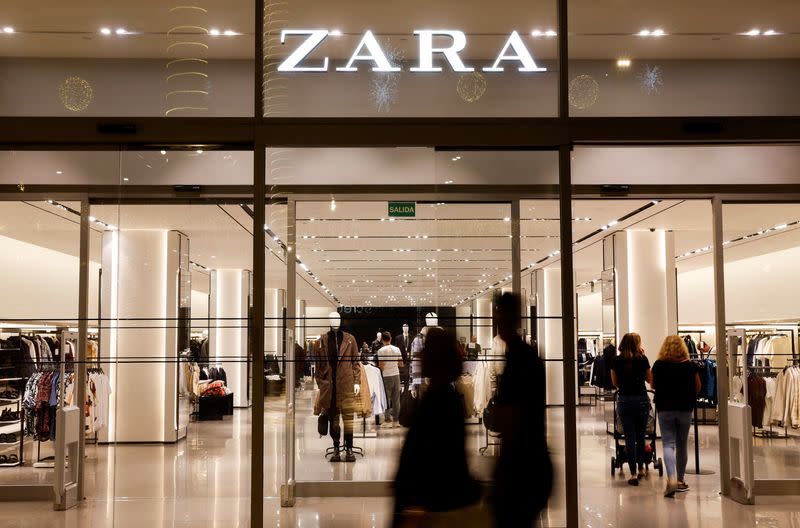Zara owner Inditex seen outshining H&M in fast-fashion showdown

MADRID/STOCKHOLM (Reuters) - Zara owner Inditex will go head-to-head with Sweden's H&M on Wednesdsay when the world's biggest fast fashion retailers release their respective results, competing to attract shoppers while managing surging energy, labour, and shipping costs.
Retailers around the world are still recovering from the impact of the COVID-19 pandemic, particularly in China where restrictions have only recently been lifted.
Both H&M and Inditex have been forced to hike their prices as the cost of producing garments increased, but Inditex - whose other brands include Massimo Dutti, Pull & Bear, and Oysho - has been better able to keep selling clothes at higher prices.
"Inditex has better ability to pass on price increases as its customer base is less price-sensitive, while H&M is in more direct competition with the cheaper players like Shein," said Nicolas Champ, retail sector analyst at Barclays in Paris.
Chinese online fashion retailer SHEIN is set to raise around $2 billion in a new funding round this month and is aiming for a U.S. listing in the second half of this year, three people with knowledge of its plans told Reuters.
Inditex - the world's biggest fast fashion retailer - is expected to report annual sales of 32.65 billion euros ($35 billion), exceeding pre-pandemic levels, partly thanks to an aggressive U.S. expansion, according to analysts polled by Refinitiv. Inditex's fiscal year runs from Feb. 1 to Jan. 31.
H&M is expected to show an 11% jump in sales for the quarter, a separate Refinitiv poll of analysts shows, ahead of quarterly earnings results on March 31.
H&M has raised prices over the past quarters, but in January Chief Executive Helena Helmersson said the company had not fully passed cost increases onto shoppers and had swallowed part of it, hurting profits.
H&M, whose other brands include Arket, Cos, Monki, and Weekday, has also been disadvantaged by a spike in shipping costs as the pandemic disrupted global supply chains.
Half of Inditex's suppliers are located near its headquarters in A Coruña, a port city in northwestern Spain, which the company says allows it to accelerate production times compared to rivals.
Inditex shares have outperformed H&M, which was slower in raising prices.
GRAPHIC: Inditex outperforms H&M (https://fingfx.thomsonreuters.com/gfx/mkt/znpnbxyabpl/Inditex%20HM%20chart.PNG)
"Being long Inditex and short H&M has been a successful trade," said Champ. However, he added, Inditex will face questions from analysts on Wednesday about its medium-to-long term growth plans.
Analysts predict 2023 will be a more challenging year for Inditex due in part to higher operating costs after it gave employees in its home market of Spain a 20% pay increase.
Inditex's performance in China, which accounted for 4.7% of profit before taxes in 2021, will also be closely watched. Inditex closed 34 stores in mainland China over its 2021 fiscal year.
H&M, which has struggled in China after its concerns over alleged human rights abuses in Xinjiang led to a social media-inspired boycott by shoppers, did not provide Chinese sales figures for its 2022 fiscal year - a departure from previous years when it gave a breakdown of its top 10 markets.
($1 = 0.9325 euros)
(Reporting by Corina Pons in Madrid and Marie Mannes in Stockholm, Additional reporting by Helen Reid in London, Editing by Emelia Sithole-Matarise)

 Yahoo Finance
Yahoo Finance 